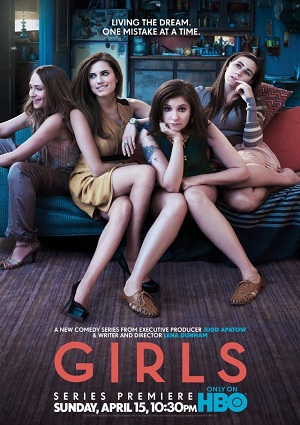http://www.npr.org/2012/05/07/152183865/lena-dunham-addresses-criticism-aimed-at-girls
I have not seen the show, or even heard of it, but the interview brought up a whirlwind of contemporary pop-culture issues. If you want to hear about Girls, listen to the story. It's good. I'm going to take some tidbits from the interview, and run with them. Far and fast.
 |
| You'll make it.... eventually. |
Girls (HBO, 2012 - )
New Girl (FOX, 2011 - )
2 Broke Girls (CBS, 2011 - )
Lost Girl (Showcase, 2010 - / SyFy, 2011 - )
Secret Diary of a Call Girl (ITV2 2007 -2011 / Showtime 2009 - 2011)
Girlfriends (CW, 2008)
The Girls Next Door (E!, 2005 - )
~Gilmore Girls (2000 -2007)
*Gossip Girl (CW, 2007)
Besides the asterisked titles, all these shows center around 20+ year old women trying to 'get through their days'. Most often, these girls live within a transitional time of their lives; between adulthood and childhood. Their struggles involve identity and where the role they play in the world. We don't see these women as particularly strong or competent, but definitely tenacious individuals that at least try to succeed at something. Somehow these women live in isolation (from success, from their roommates, from normal society, etc), but they constantly redefine themselves in order to figure out how to fit in while trying to figure out who they are.
 |
| 'New Girl' The guys looking at Jess: She's so Free, Out of Control, and Crazy!! |
Do these shows define this generation of feminism? Are they contemporized portraits of vulnerable, weak women? Or are they generic simplifications real middle-class young women's lives?
Its hard to look at these shows and think of them as cutting edge or promoting women's rights. But if we compare the women on these shows to the political atmosphere, they are pushing somebody's comfort zones. Women's identity has been closely tied with sexuality; not in the sense of a harlot or prude, but in the sense that sexual experiences as a way of understanding the self. Rather than finding their place in the workplace, among a group of friends, or with a husband, girls find their true identity through raw intimacy. We can spin this as final step towards equality. Women have constitutional rights, equal access to education, and the opportunity to hold any job. Sexual freedom seems to be the last step.
 |
| Xena 90's Feminism |
 |
| Secret Diary of a Call Girl Today's Feminism? |
Then again, the women in these shows portray vulnerability and ineptitude. They are not self sustaining women, but struggle with both themselves and the world around them. Often the sexual encounters rely on their partner's wants or desires, not their own. These shows perpetuate male objectification of women as sex toys. Occupational or familial concerns become the source of strife rather than the context for it. We see life portrayed as arduous without a stable relationship. The 'girls' in these shows are usually waitresses, teachers, or strippers- traditionally female occupations, or just altogether unemployed. They don't seem overly concerned with higher aspirations. A job can help, but who cares! Joe dumped me!! Boohoo.
 |
| Gilmore Girls There can't be a dance without tears. |
A stable relationship does help in life though, and sexual freedom is important. In the end these shows have to be simplification. The producers just want people to watch their shows so they can make money. They aren't trying to start a revolution (the networks would not stand for that). Perhaps the shows reveal, through simplification, society's perception of young women. Twenty somethings know we're suppose to be independent, sharp minded individuals, but how? The default answer seems to be through sexual exploration, but that by no means makes it the best answer.
No comments:
Post a Comment